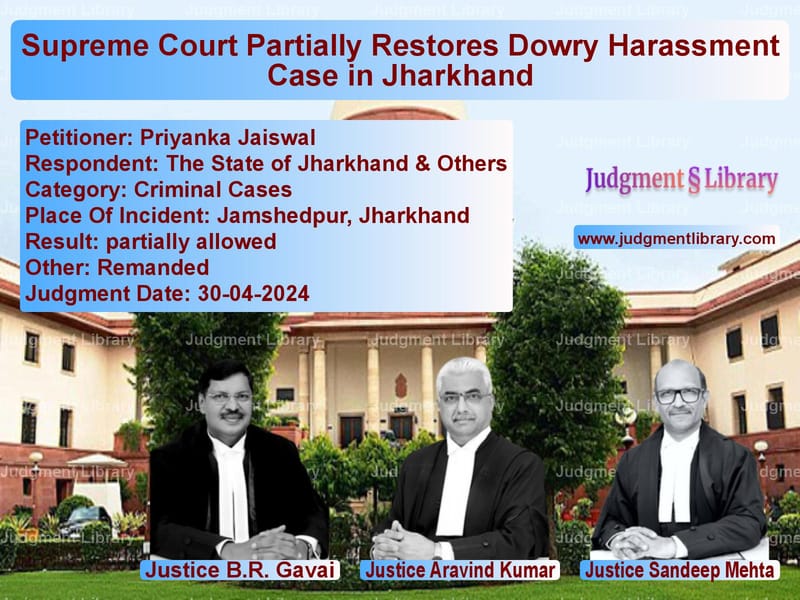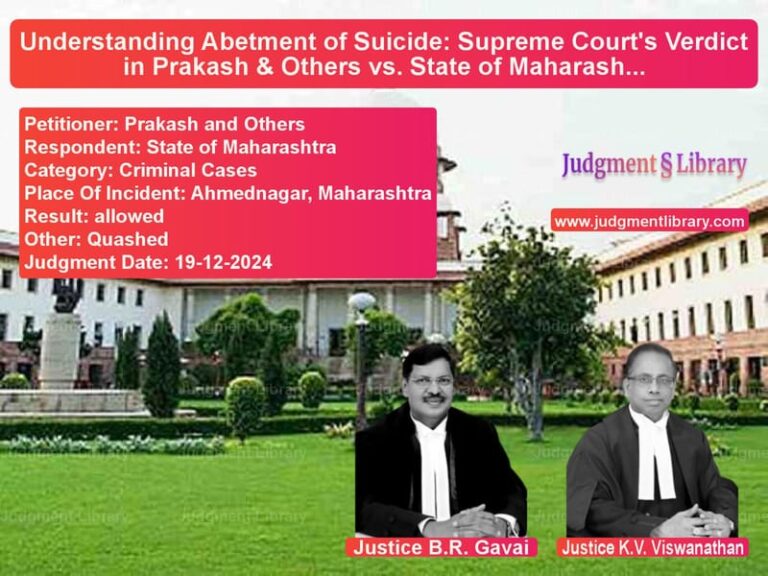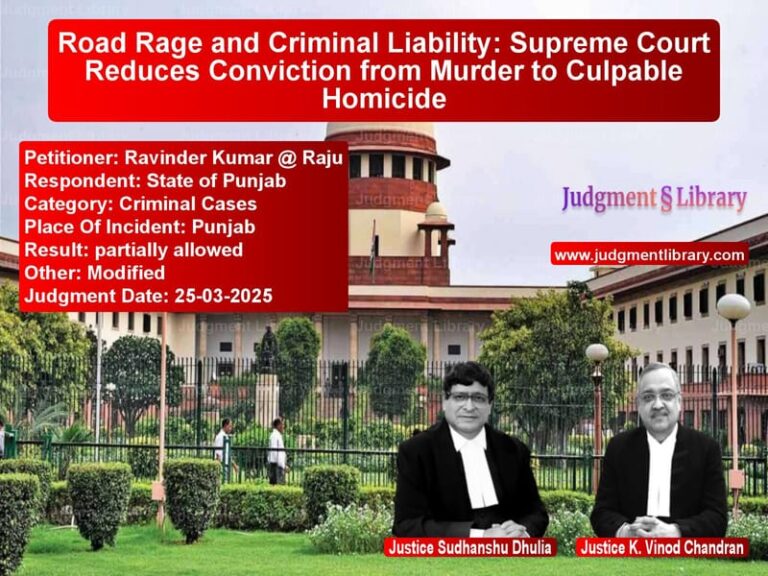Supreme Court Partially Restores Dowry Harassment Case in Jharkhand
The case of Priyanka Jaiswal vs. The State of Jharkhand & Others revolves around allegations of dowry harassment, domestic violence, and wrongful confinement. The Supreme Court was called upon to determine whether the Jharkhand High Court erred in quashing the criminal proceedings initiated against certain accused despite serious allegations.
Background of the Case
The appellant, Priyanka Jaiswal, married the respondent, Respondent No. 8, under the Special Marriage Act on October 5, 2018, in Kolkata, followed by customary rituals in Jamshedpur on January 18, 2019. Shortly after marriage, the appellant moved with her husband to Frankfurt, Germany, where he was residing for work.
According to the appellant:
- Her in-laws, Respondent Nos. 3 and 4, constantly complained about inadequate dowry.
- She was verbally and physically abused for not bringing ₹50 lakh in cash, a car, and a flat in Kolkata as dowry.
- Upon returning to India, she was denied entry into her matrimonial home and physically assaulted.
- She was forcibly confined and rescued only with the help of her parents.
On March 4, 2021, the appellant filed a complaint, leading to the registration of FIR No. 68 of 2021 at Jamshedpur Police Station under:
- Section 323 IPC – Voluntarily causing hurt
- Section 498A IPC – Cruelty by husband or relatives
- Section 504 IPC – Intentional insult to provoke breach of peace
- Section 506 IPC – Criminal intimidation
- Section 3 & 4 of the Dowry Prohibition Act, 1961 – Demanding and accepting dowry
Respondent Nos. 3 to 8 ignored multiple police notices, resulting in the issuance of non-bailable warrants. Despite repeated attempts, they failed to seek cancellation of the warrants.
High Court’s Quashing of the Case
- The accused moved the Jharkhand High Court under Section 482 CrPC to quash the FIR.
- The High Court ruled in favor of the accused, quashing proceedings against all respondents on three grounds:
- Non-compliance with Section 41A CrPC: The arrest of Respondents 3 and 4 was illegal due to lack of notice.
- Jurisdictional issues: The alleged offenses occurred in Kolkata and Germany, not Jamshedpur.
- Omnibus allegations: The complaint lacked specific details regarding individual acts of cruelty.
The appellant challenged this order in the Supreme Court.
Arguments by the Appellant (Priyanka Jaiswal)
- The High Court wrongly applied a criminal standard of proof at a preliminary stage.
- Her allegations against her husband and in-laws were detailed and specific.
- The High Court ignored legal precedents allowing dowry harassment cases to be filed where the victim resides after being thrown out.
- Jurisdiction was proper as she was forced to leave her matrimonial home and take shelter in Jamshedpur.
- The High Court conducted a “mini-trial,” which was impermissible at the FIR stage.
Arguments by the Respondents (Accused)
- They were illegally arrested without following Section 41A CrPC.
- The allegations were vague, with no specific acts attributed to individual accused.
- The appellant is a resident of Frankfurt, Germany, and the alleged acts occurred outside Jamshedpur.
- The husband had already obtained a divorce from a Family Court in Frankfurt.
Supreme Court’s Analysis and Judgment
The Supreme Court found that the High Court had committed serious errors in its ruling:
- Jurisdiction was proper: “When a woman takes shelter at her parental home after being thrown out, she can file a complaint from that jurisdiction.”
- Detailed allegations were made against Respondents 3, 4, and 8: “The complaint explicitly mentions dowry demands and physical assault.”
- High Court wrongly quashed the FIR: “It conducted a detailed examination of facts, which is impermissible at the pre-trial stage.”
The Supreme Court ruled:
“The High Court’s order quashing proceedings against Respondents 3, 4, and 8 is legally unsustainable. However, proceedings against Respondents 5, 6, and 7 are quashed due to lack of specific allegations.”
Supreme Court’s Final Order
- The appeal was partially allowed.
- The High Court’s order was set aside for Respondents 3, 4, and 8.
- The case against Respondents 5, 6, and 7 was quashed.
- The case against the husband and in-laws will proceed in the Trial Court.
Legal Implications of the Judgment
- Dowry harassment cases can be filed where the victim resides after expulsion from her matrimonial home.
- High Courts should not conduct mini-trials while deciding quashing petitions.
- General allegations without specific acts are not enough to prosecute distant relatives.
- Section 41A CrPC violations do not automatically result in case dismissal.
Conclusion
The Supreme Court’s ruling reinforces women’s rights in matrimonial disputes and prevents accused individuals from escaping trial based on procedural technicalities. By allowing the case to continue against key accused, the Court upheld the principle that justice should not be denied at a preliminary stage.
Read also: https://judgmentlibrary.com/supreme-court-restores-criminal-proceedings-in-odisha-land-fraud-case/
Petitioner Name: Priyanka Jaiswal.Respondent Name: The State of Jharkhand & Others.Judgment By: Justice B.R. Gavai, Justice Aravind Kumar, Justice Sandeep Mehta.Place Of Incident: Jamshedpur, Jharkhand.Judgment Date: 30-04-2024.
Don’t miss out on the full details! Download the complete judgment in PDF format below and gain valuable insights instantly!
Download Judgment: priyanka-jaiswal-vs-the-state-of-jharkha-supreme-court-of-india-judgment-dated-30-04-2024.pdf
Directly Download Judgment: Directly download this Judgment
See all petitions in Dowry Cases
See all petitions in Domestic Violence
See all petitions in Bail and Anticipatory Bail
See all petitions in Judgment by B R Gavai
See all petitions in Judgment by Aravind Kumar
See all petitions in Judgment by Sandeep Mehta
See all petitions in partially allowed
See all petitions in Remanded
See all petitions in supreme court of India judgments April 2024
See all petitions in 2024 judgments
See all posts in Criminal Cases Category
See all allowed petitions in Criminal Cases Category
See all Dismissed petitions in Criminal Cases Category
See all partially allowed petitions in Criminal Cases Category







